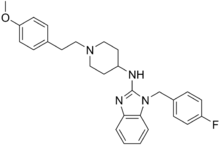Astemizol
Klinički podaci
Robne marke
Alermizol, Astemisan, Astemisol, Astemison
AHFS/Drugs.com
Monografija
Identifikatori
CAS broj
68844-77-9
ATC kod
R06 AX11
PubChem [ 1] [ 2] 2247
DrugBank
DB00637
ChemSpider [ 3] 2160
KEGG [ 4] C06832 Y
ChEBI
CHEBI:2896 Y
ChEMBL [ 5] CHEMBL296419 Y
Hemijski podaci
Formula
C 28 H 31 F N 4 O
Mol. masa
458,570
SMILES
eMolekuli PubHem
InChI InChI=1S/C28H31FN4O/c1-34-25-12-8-21(9-13-25)14-17-32-18-15-24(16-19-32)30-28-31-26-4-2-3-5-27(26)33(28)20-22-6-10-23(29)11-7-22/h2-13,24H,14-20H2,1H3,(H,30,31) Y
Fizički podaci
Tačka topljenja
149.1 °C (300 °F)
Farmakokinetički podaci
Poluvreme eliminacije
1 dan
Farmakoinformacioni podaci
Trudnoća
?
Pravni status
Način primene
Oralno
Astemizol je organsko jedinjenje , koje sadrži 28 atoma ugljenika i ima molekulsku masu od 458,570 Da .[ 6] [ 7] [ 8] [ 9]
↑ Li Q, Cheng T, Wang Y, Bryant SH (2010). „PubChem as a public resource for drug discovery.” . Drug Discov Today 15 (23-24): 1052-7. DOI :10.1016/j.drudis.2010.10.003 . PMID 20970519 . edit ↑ Evan E. Bolton, Yanli Wang, Paul A. Thiessen, Stephen H. Bryant (2008). „Chapter 12 PubChem: Integrated Platform of Small Molecules and Biological Activities”. Annual Reports in Computational Chemistry 4 : 217-241. DOI :10.1016/S1574-1400(08)00012-1 . ↑ Hettne KM, Williams AJ, van Mulligen EM, Kleinjans J, Tkachenko V, Kors JA. (2010). „Automatic vs. manual curation of a multi-source chemical dictionary: the impact on text mining” . J Cheminform 2 (1): 3. DOI :10.1186/1758-2946-2-3 . PMID 20331846 . edit ↑ Joanne Wixon, Douglas Kell (2000). „Website Review: The Kyoto Encyclopedia of Genes and Genomes — KEGG” . Yeast 17 (1): 48–55. DOI :10.1002/(SICI)1097-0061(200004)17:1<48::AID-YEA2>3.0.CO;2-H . ↑ Gaulton A, Bellis LJ, Bento AP, Chambers J, Davies M, Hersey A, Light Y, McGlinchey S, Michalovich D, Al-Lazikani B, Overington JP. (2012). „ChEMBL: a large-scale bioactivity database for drug discovery”. Nucleic Acids Res 40 (Database issue): D1100-7. DOI :10.1093/nar/gkr777 . PMID 21948594 . edit ↑ Wang X, Hockerman GH, Green HW 3rd, Babbs CF, Mohammad SI, Gerrard D, Latour MA, London B, Hannon KM, Pond AL: Merg1a K+ channel induces skeletal muscle atrophy by activating the ubiquitin proteasome pathway. FASEB J. 2006 Jul;20(9):1531-3. Epub 2006 May 24. PMID 16723379
↑ Chong CR, Chen X, Shi L, Liu JO, Sullivan DJ Jr: A clinical drug library screen identifies astemizole as an antimalarial agent. Nat Chem Biol. 2006 Aug;2(8):415-6. Epub 2006 Jul 2. PMID 16816845
↑ Knox C, Law V, Jewison T, Liu P, Ly S, Frolkis A, Pon A, Banco K, Mak C, Neveu V, Djoumbou Y, Eisner R, Guo AC, Wishart DS (2011). „DrugBank 3.0: a comprehensive resource for omics research on drugs” . Nucleic Acids Res. 39 (Database issue): D1035-41. DOI :10.1093/nar/gkq1126 . PMC 3013709 . PMID 21059682 . ↑ David S. Wishart, Craig Knox, An Chi Guo, Dean Cheng, Savita Shrivastava, Dan Tzur, Bijaya Gautam, and Murtaza Hassanali (2008). „DrugBank: a knowledgebase for drugs, drug actions and drug targets” . Nucleic Acids Res 36 (Database issue): D901-6. DOI :10.1093/nar/gkm958 . PMC 2238889 . PMID 18048412 . ↑ Ghose, A.K., Viswanadhan V.N., and Wendoloski, J.J. (1998). „Prediction of Hydrophobic (Lipophilic) Properties of Small Organic Molecules Using Fragment Methods: An Analysis of AlogP and CLogP Methods” . J. Phys. Chem. A 102 : 3762-3772. DOI :10.1021/jp980230o . ↑ Tetko IV, Tanchuk VY, Kasheva TN, Villa AE. (2001). „Estimation of Aqueous Solubility of Chemical Compounds Using E-State Indices” . Chem Inf. Comput. Sci. 41 : 1488-1493. DOI :10.1021/ci000392t . PMID 11749573 . ↑ Ertl P., Rohde B., Selzer P. (2000). „Fast calculation of molecular polar surface area as a sum of fragment based contributions and its application to the prediction of drug transport properties” . J. Med. Chem. 43 : 3714-3717. DOI :10.1021/jm000942e . PMID 11020286 .
Receptor
Agonisti :
2-Piridiletilamin •
Betahistin •
Histamin •
HTMT •
UR-AK49 Antagonisti :
1. generacija :
4-Metildifenhidramin •
Alimemazin •
Antazolin •
Azatadin •
Bamipin •
Benzatropin/Benztropin •
Bepotastin •
Bromazin •
Bromfeniramin •
Buklizin •
Kaptodiam •
Karbinoksamin •
Hlorciklizin •
Hloropiramin •
Hloroten •
Hlorfenamin •
Hlorfenoksamin •
Cinarizin •
Klemastin •
Klobenzepam •
Klocinizin •
Ciklizin •
Ciproheptadin •
Dacemazin •
Deptropin •
Deksbromfeniramin •
Dekshlorfeniramin •
Dimenhidrinat •
Dimetinden •
Difenhidramin •
Difenilpiralin •
Doksilamin •
Embramin •
Etodroksizin •
Etibenzatropin/Etilbenztropin •
Etimemazin •
Flunarizin •
Histapirodin •
Homohlorciklizin •
Hidroksietilprometazin •
Hidroksizin •
Izoprometazin •
Izotipendil •
Meklozin •
Mepiramin/Pirilamin •
Mehitazin •
Metafurilen •
Metapirilen •
Metdilazin •
Moksastin •
Niaprazin •
Orfenadrin •
Oksatomid •
Oksomemazin •
Fenindamin •
Feniramin •
Feniltoloksamin •
Pimetiksen •
Piperoksan •
Pipoksizin •
Prometazin •
Propiomazin •
Pirobutamin •
Talastin •
Tenalidin •
Tenildiamin •
Tiazinamijum •
Tonzilamin •
Tolpropamin •
Tripelenamin •
Triprolidin
2. generacija : Akrivastin • Alinastin • Astemizol • Azelastin • Bamirastin • Barmastin • Bepiastin • Bepotastin • Bilastin • Kabastinen • Karebastin • Ketirizin • Klemastin • Klemizol • Klobenztropin • Dorastin • Ebastin • Emedastin • Epinastin • Flezelastin • Ketotifen • Latrepirdin • Levokabastin • Linetastin • Loratadin • Mapinastin • Mebhidrolin • Mizolastin • Moksastin • Noberastin • Oktastin • Olopatadin • Perastin • Piklopastin • Rokastin • Rupatadin • Setastin • Talastin • Temelastin • Terfenadin • Zepastin
3. generacija : Desloratadin • Feksofenadin • Cetirizin • Levocetirizin
Negrupisani : Belarizin • Efletirizin • Elbanizin • Flotrenizin • Medrilamin • Napaktadin • Pibaksizin • Tagorizin • Trelnarizin • Trenizin • Vapitadin
Razni :
Triciklični antidepresanti (
amitriptilin , •
doksepin , •
trimipramin , itd) •
Tetraciklični antidepresanti (
mianserin , •
mirtazapin , itd) •
Tipični antipsihotici (
hlorpromazin , •
tioridazin , itd) •
Atipični antipsihotici (
klozapin , •
olanzapin , •
hetiapin , itd)
Transporter
Enzim
Drugi


